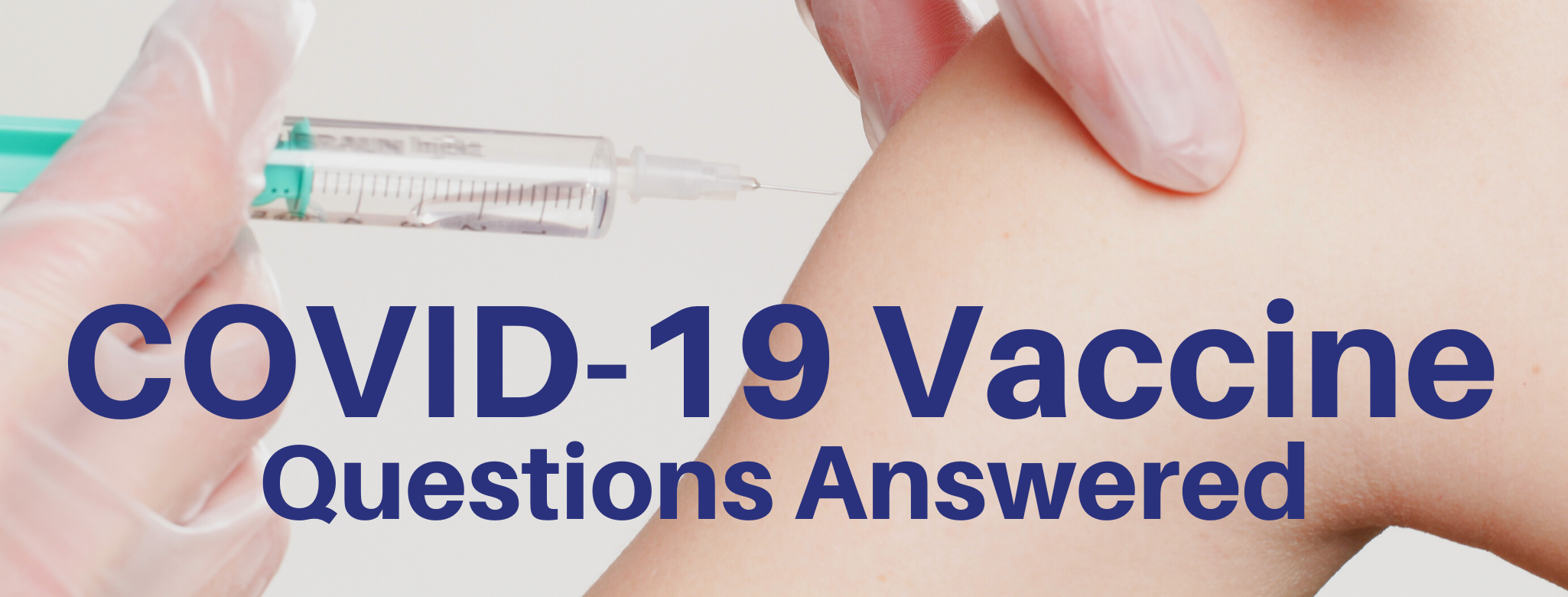COVID-19 Vaccines – You’ve got questions, we’ve got answers!
We understand that you may have concerns about getting the COVID-19 vaccine. We wanted to provide information to our patients and answer questions you may have about it. Given there are so many opinions on the internet, we recommend that you limit your information to reputable medical organizations and the CDC. You can also always ask your doctor if you have additional questions or concerns. Below you will find a list of common questions with explanations that follow. Thank you for your interest!
Can I get a COVID-19 infection from the COVID-19 vaccine?
No. The currently available COVID-19 vaccines do not contain live viruses, so the vaccines will not make you sick with COVID-19 infection.
Are the available COVID-19 vaccines effective at protecting against getting COVID-19 infection?
Yes. The currently available vaccines are highly effective at preventing COVID-19 infection. A recently published study, from one of the most highly reputable medical journals in the world, demonstrated a 94.1% efficacy for the vaccine preventing symptomatic COVID-19 infection. This efficacy was similar across a wide range of age groups and in patients who previously had COVID-19 infection. This same study showed, among all patients who received the vaccine, not a single patient developed severe COVID-19 infection.
What are the benefits of getting the COVID-19 vaccine?
From the information that is available right now, there are several anticipated benefits from the COVID-19 vaccine. First, it will decrease your chances of getting infected with COVID-19. Second, it can decrease your chances of getting very sick if you do get COVID-19. Third, it will protect the people around you. And finally, in time, if enough patients get vaccinated, we can ideally achieve herd immunity, meaning that enough people in our community are protected from getting COVID-19 infection. This makes it harder to spread the virus and protects people who cannot get the vaccine, like infants.
Are the COVID-19 vaccines safe?
Both vaccines have met rigorous safety criteria. In addition, the CDC continues to monitor patients after receiving the vaccines, which is providing additional safety information. The standard processes and procedures required for approval of vaccines in the United States have and are being maintained, with all the vaccines that have been produced and are currently in production. This includes 3 phases of carefully examined clinical trials. All vaccines must show they are safe and effective before they are approved.
Should I worry about any side effects after I receive the COVID-19 vaccine?
In a large analysis of patients who received the COVID-19 vaccine, the most common adverse event was pain at the injection site. There were no statistically significant serious adverse events, including no evidence of respiratory disease. You should not get the vaccine if you have a history of a severe allergic reaction to any component of the vaccine. Studies show this is only occurring in 1/1000 to 1/2000 patients.
I have a chronic GI or liver condition, should I get vaccinated for COVID-19?
Yes, vaccination is very important. Patients with underlying medical conditions are at increased risk for severe illness from COVID-19. The British Society of Gastroenterology and Inflammatory Bowel Disease Clinical Research Group have published guidance strongly supporting vaccination in patients with underlying GI conditions.
I have a weakened immune system due to a medical condition or medication I am on. How does this affect my getting the vaccine?
The CDC recommends that you receive a COVID-19 vaccine. It is important to know that safety information is not yet available for patients with a weakened immune system. Patients with weakened immune systems should be aware that the effectiveness of the vaccine may be diminished compared to the general population. However, the benefits are still likely to outweigh these theoretical concerns.
Do I still need to get the COVID-19 vaccine if I already had a COVID-19 infection?
Yes, as COVID-19 reinfection is possible. If you received treatment for COVID-19 infection, you should speak with your doctor to discuss the timing of your COVID-19 vaccine.
Can I get the COVID-19 vaccine with another vaccine (like the flu or pneumonia vaccine)?
If you are going to get the COVID-19 vaccine, you should wait 14 days between getting another vaccine. This is not related to an increased risk of side effects or interactions when getting 2 vaccines together, but rather to monitor for any vaccine side effects.
Do I still need to follow standard COVID-19 precautions after getting the COVID-19 vaccine?
Yes, you should continue to wear a mask, wash your hands often, and practice social distancing. This offers the best protection against COVID-19 infection. You should also stay up-to-date with any new recommendations from the CDC.
What are the currently approved COVID-19 vaccines?
The Pfizer-BioNTech and Moderna COVID-19 vaccines.
Where can I get my vaccine and get up-to-date information regarding COVID-19 vaccinations in North Carolina?
Covid19.ncdhhs.gov – You can find testing sites, statistics, and information on COVID-19 infection and vaccination in North Carolina. This also includes a link to the CDC website.
Have you received your vaccine? Tell us about it below.
By: Dr. Frank Senatore
Formally a physician at Digestive Health Specialists
Digestive Health Specialists, PA is here to help if you, or someone you know, would like more information, or if you are experiencing any digestive health symptoms and would like further evaluation. Feel free to give us a call at 336-768-6211 or fill the form below.






